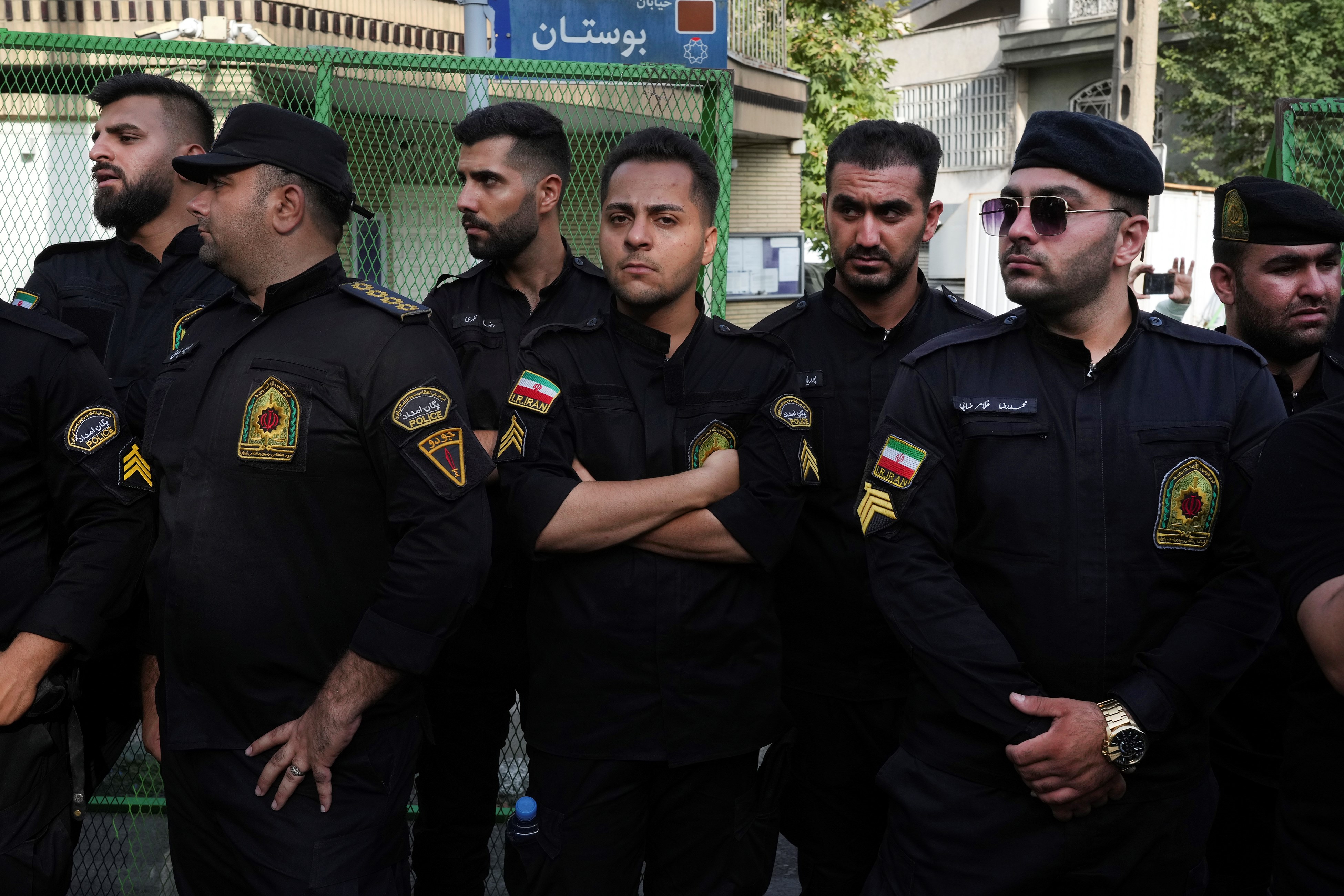Iranian security arrests terror network set to target Muharram nights
The Iranian Ministry of Security announces the arrest of a large "Zionist terrorist network", in possession of 43 bombs, that were planning to carry out sabotage operations across the country.
-

Iranian police officers stand guard during a protest against Sweden in front of the Swedish Embassy in Tehran, Iran, Friday, July 21, 2023. (AP)
The Iranian Ministry of Security announced, on Monday, that it arrested a large terrorist network with Israeli links inside the country.
As cited by Iranian media, Iran's Security Ministry stated that the security forces had arrested "members of a large Zionist-terrorist network in possession of 43 bombs" that have "high destructive power and remote control capabilities." The ministry confirmed that the bombs were neutralized.
Among the 43 bombs, the ministry revealed that 20 of the bombs were launch-capable, which proved that they were "prepared with the intention of using them against people taking part in Muharram ceremonies."
The ministry further revealed that "all kinds of explosive metals, related detonators, industrial chemicals and explosive precursors, electronic kits, control remotes for directing the explosion from a distance, explosive fuses, several pieces of colt pistols, shotguns, and large amounts of cold weapons and tools used only in street disturbances were discovered and confiscated" in the houses of the terrorists.
The ministry also indicated that the network was planning to carry out sabotage operations during the month of Muharram, including the bombing of the shrine of Martyr Lieutenant General Qassem Soleimani, pointing out that "the employers of these networks reside in Denmark and the Netherlands."
Read more: Four police officers killed in terrorist attack southeast of Iran
The terrorists "intended to carry out numerous acts of sabotage in the provinces of Tehran, Kerman, Isfahan, Kohgiluyeh and Boyer Ahmad, Kurdistan and Mazandaran," according to the statement.
According to the statement, the arrested terrorists had previously carried out several attacks on Iranian soil and filmed themselves doing so to send it to their employers as proof that they would be capable and willing to conduct more complex operations.
Moreover, the ministry outlined that the terrorists also sent their video footage to "the terrorist media based in Europe and America," and included content such as "throwing Molotov cocktails at government buildings, attacks on Basij bases, setting fire to several banks, several ATMs, city buses, telecommunication antennas, creating an explosion in front of the office of one of the religious Marjaas in Sari, and hoisting the flag of the Zionist Temporary Regime and flags attributed to royalist groups in various places."
To conclude, the Iranian Ministry of Security reaffirmed that it "reserves its right to pursue proxy terrorists beyond the borders of the country and will continue to take appropriate measures against the supporters of terrorism."
Iran too powerful to be threatened: Defense Minister
Earlier, on July 19, Iran's Defense Minister Brigadier General Mohammad Reza Ashtiani declared that the Islamic Republic has achieved an unparalleled level of power, rendering it invincible to threats from any external source.
Ashtiani made these remarks during a cabinet meeting, in response to the Pentagon's recent announcement of planning to deploy the USS Thomas Hudner destroyer, as well as F-16 and F-35 fighter jets, to the Gulf region.
“The US is pursuing its own affairs. The Islamic Republic of Iran is basically at a level of power and capability that no one can threaten it,” the minister said.
The Defense Ministry, Ashtiani added, has collaborated with knowledge-based companies, aiming to enhance the Iranian Armed Forces' capabilities.
Echoing the same points, Chief of Staff of the Iranian Armed Forces Major General Mohammad Baqeri recently pointed out that enemies have refrained from employing military rhetoric against Iran due to its "sustainable deterrence."
Read more: Raisi describes Sweden's response to Quran burning as insufficient

 4 Min Read
4 Min Read








